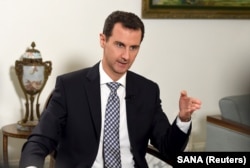The Chaldean bishop of Aleppo in Syria, Antoine Audo, says a political agreement imposed by external or foreign powers would not end Syria’s five-year-long civil war.
Bishop Audo says the Syrians themselves must want to arrive at a peaceful solution for a negotiated settlement to work.
He lives in the government-controlled part of Aleppo. He blames the war on extremists in Syria and other countries of the Middle East who reject the secular values promoted by the modern world.
He notes Christians and Muslims have lived together harmoniously for centuries in Syria, but, he says extremists have destroyed the peaceful co-existence by deliberately turning the Syrian conflict into a religious and ethnic war.
Before the war began in 2011, he says there were 1.5 million Christians in Syria. Now there are 500,000. In his own city of Aleppo, he says the Christian community has been reduced from 160,000 to 40,000.
The bishop says he is happy to see the resumption of U.N.-mediated peace negotiations between the government and opposition groups. Audo says he recognizes that the United States, Russia and other foreign powers can play an important role in moving the peace process forward, but, he tells VOA the solution has to come from inside Syria.
“Americans have to trust in the peace and to respect the Syrian people and to not impose solutions from outside for economical and strategic interests,” he said.
He adds President Bashar al-Assad has overwhelming support from the Christian community in Syria.
“Knowing a little bit the situation, 80 percent of the Christians at the level of patriarch, bishops, priests, Christians are — if there are elections, will choose Bashar al-Assad because we know what happened in Iraq and we do not see any future for Syria with those extremists,” he said.
The bishop says he believes more than 50 percent of the population, including Sunnis, would choose Assad as president if a democratic election were to be held now in Syria.










